- CVS has consistently beaten earnings expectations in past three years
- Outlook for longer-term shares growth outlook muted
- Wall Street consensus outlook continues to be bullish, suggesting shares are under-valued
- If you’re interested in upgrading your search for new investing ideas, check out InvestingPro+
CVS Health Corp (NYSE:CVS) reported Q1 results May 4, beating expectations on earnings and revenue. CVS continues to benefit substantially from COVID-19, with 6 million tests administered and 8 million vaccines given in Q1. There are potential long-term benefits for CVS as a result of having 41 million new customers from testing and vaccine services. The company’s three major business lines (retail pharmacy, health services and pharmacy services) all had solid performance in Q1.
Since closing at a 12-month high of $110.83 Feb. 8, CVS has fallen 11.2%. The stock’s YTD total return, -4.4%, is considerably better than the S&P 500 (SPDR® S&P 500 (NYSE:SPY)), -15.2%. CVS is not immune to the declining market, but is fairly resistant to the overall bearish trend, with a beta of 0.62 versus the S&P 500 (trailing three years).
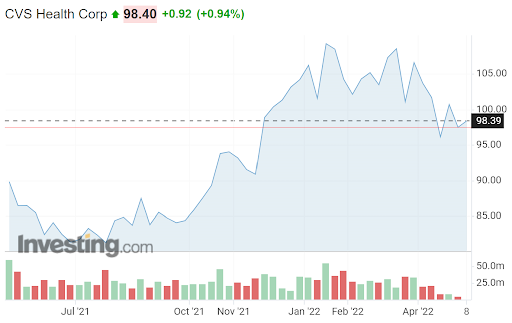
(Source: Investing.com)
CVS has beaten expectations on EPS consistently for several years, but the modest earnings growth is hard to see against the background of volatility from the pandemic. The consensus for expected EPS growth over the next three to five years is 6.2% per year, about half that for the sector median.

(Source: E-Trade)
CVS management has executed well in recent years, taking full advantage of the market needs during the pandemic. The challenge is in maintaining growth going forward. The company’s focus on becoming a health-care destination, providing a range of services, is compelling, but maintaining earnings growth is only going to get harder. The stock’s low valuation, with a trailing P/E of 16.2 and forward P/E of 11.6, looks viable even with muted growth, however.
I last wrote about CVS on November 10, 2021, at which time I assigned a bullish/buy rating. Since then, CVS has returned a total of +6.7% vs. -13.1% for the S&P 500 over the same period. When I assigned this rating, the Wall Street consensus rating was bullish, with a consensus 12-month price target that implied an expected total return of 14.4% (including the dividend).
Along with the Wall Street consensus, I also rely on the consensus outlook implied by the prices of options on a stock, the market-implied outlook. The market-implied outlook to mid-2022 was neutral to slightly bullish, with fairly low expected volatility (27% annualized).
For readers who are unfamiliar with the market-implied outlook, a brief explanation is needed. The price of an option on a stock reflects the market’s consensus estimate of the probability that the stock price will rise above (call option) or fall below (put option) a specific level (the option strike price) between now and when the option expires. By analyzing the prices of put and call options at a range of strike prices, all with the same expiration date, it is possible to calculate a probable price forecast that reconciles the options prices. This is the market-implied outlook, and represents the consensus view among buyers and sellers of options. For a deeper discussion, I recommend this excellent monograph published by the CFA Institute.
There have been two quarterly earnings reports since my last analysis of CVS, Q4 of 2021 and Q1 of 2022, the company beating EPS expectations for both. With these strong results, as well as the significant outperfomance of the shares versus the broader market over this six-month period, I am revisiting my position on CVS. I have calculated the market-implied outlook for CVS to early 2023 and compared this with the current Wall Street consensus outlook.
Wall Street Consensus Outlook For CVS
E-Trade calculates the Wall Street consensus outlook by combining the views of nine ranked analysts who have published ratings and price targets over the past three months. The consensus rating is bullish and the consensus 12-month price target is $118.56, 20.3% above the current share price. For a low-beta, low-volatility stock like CVS, this level of expected return is attractive. The 12-month price target is about $10 higher than it was for my analysis in November. There is a fairly low spread among the price targets, which adds confidence in the predictive value of the consensus.
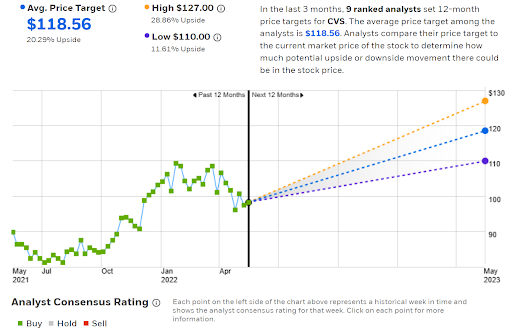
(Source: E-Trade)
Investing.com’s version of the Wall Street consensus outlook is calculated using ratings and price targets from 27 analysts. The consensus rating is bullish, with a 12-month consensus price target that is 19.7% above the current share price. There is somewhat more spread among the individual price targets in this sample, but the dispersion is still quite low.
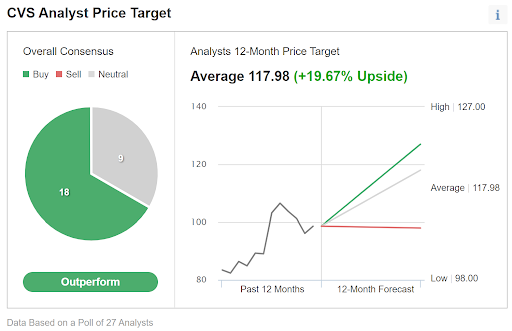
(Source: Investing.com)
The consensus ratings and price targets from E-Trade and Investing.com are very similar, which is consistent with there being a fair amount of agreement between the individual analysts. This, in turn, suggests that the consensus outlook is reasonable as a guide. In my previous analysis, the consensus 12-month price target implied an expected total return of 14.4%. The current expected total return is 20% in price appreciation (based on the consensus price target) plus the 2.3% dividend yield, for a total of 22.3%.
Market-Implied Outlook For CVS
I have calculated the market-implied outlook for CVS for the 8.1-month period from now until Jan. 20, 2023, using the prices of call and put options that expire on this date. I selected this specific expiration date to provide a view to early 2023 and because the options expiring in January tend to be among the most actively traded, adding confidence in the meaningfulness of the market-implied outlook.
The standard presentation of the market-implied outlook is a probability distribution of price return, with probability on the vertical axis and return on the horizontal.
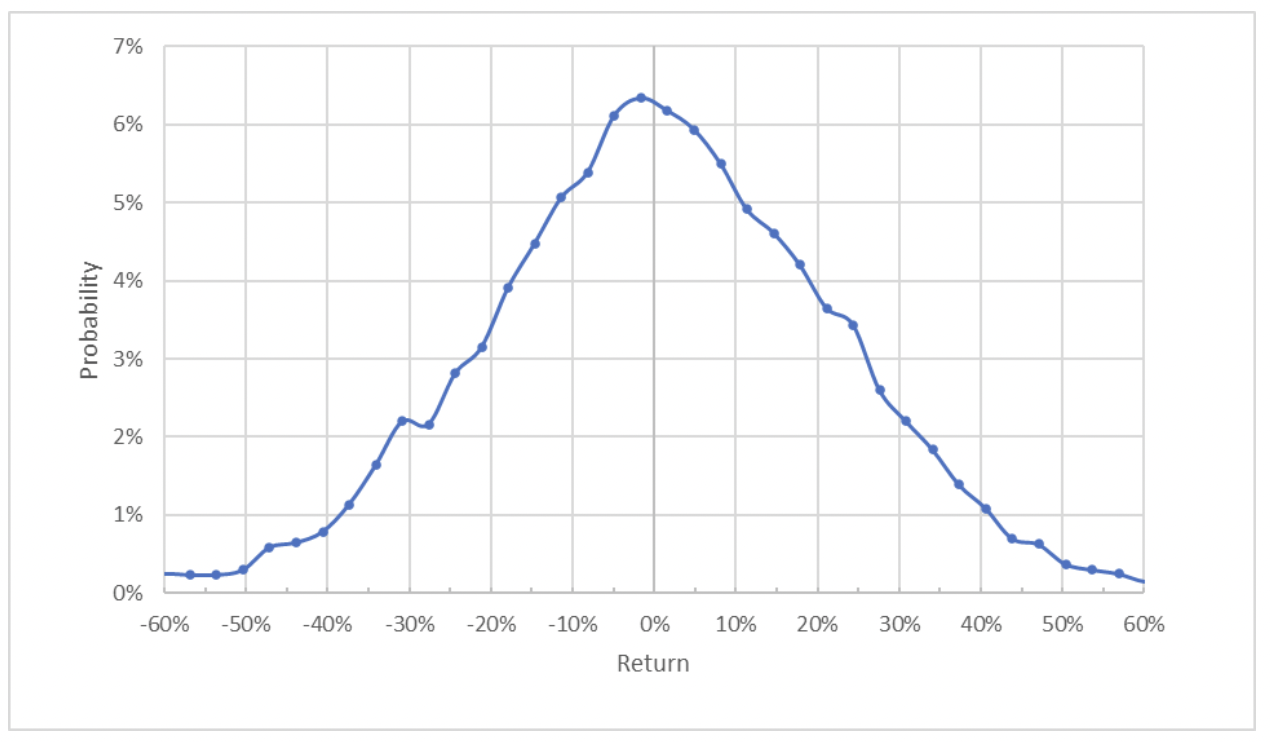
(Source: Author’s calculations using options quotes from E-Trade)
This market-implied outlook is very symmetric, with similar probabilities of positive and negative returns of the same size. The expected volatility calculated from this outlook is 30% (annualized). For comparison, E-Trade calculates 30% implied volatility for the options expiring next January.
To make it easier to directly compare the probabilities of positive and negative returns, I rotate the negative return side of the distribution about the vertical axis (see chart below).
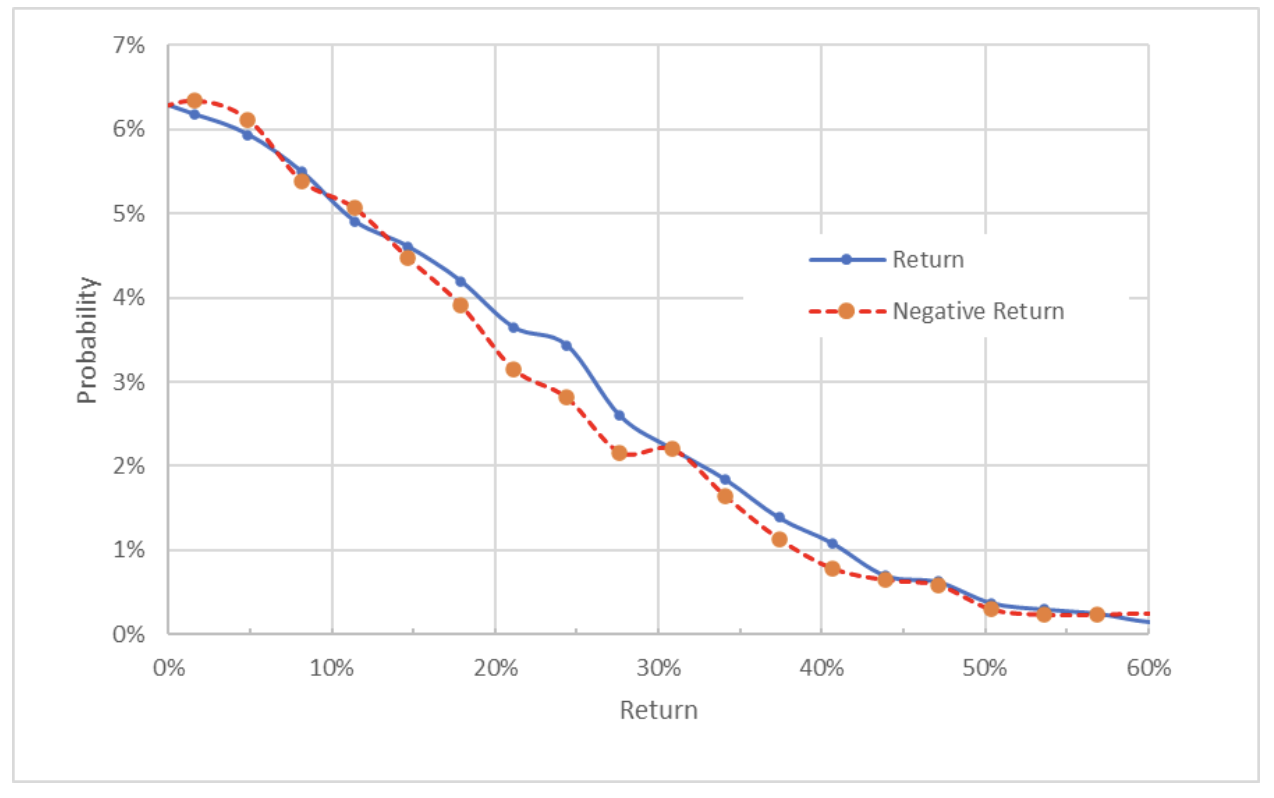
(Source: Author’s calculations using options quotes from E-Trade)
This view shows that the probabilities of positive returns tend to be slightly higher than the probabilities of negative returns of the same magnitude (the solid blue line tends to be slightly above the dashed red line). This is a small bullish tilt in the market-implied outlook.
Theory suggests that the market-implied outlook is expected to have a negative bias because investors tend to be risk-averse and, as a result, will pay more than fair value for downside protection (e.g. put options). There is no way to measure the magnitude of this effect, but the expectation that the outlook is negatively biased reinforces the interpretation of this outlook as slightly bullish. This outlook is more bullish than those from November.
Summary
CVS has consistently beaten earnings expectations in recent years. The pandemic has been a boon for CVS in terms of revenue from tests and vaccine injections, but also by bringing tens of millions of new customers to CVS sites. As the direct economic benefits of COVID subside, the earnings outlook is for modest growth. The Wall Street consensus outlook continues to be bullish and the 12-month consensus price target indicates that the shares are undervalued. As a rule of thumb for a buy rating, I want to see an expected 12-month total return that is at least half the expected volatility. Taking the consensus price target at face value, the expected total return (22.3%) is well above half the expected volatility calculated from the market-implied outlook. The market-implied outlook for CVS to early 2023 is slightly bullish, as well. I am maintaining my ratings of bullish/buy on CVS.
Interested in finding your next great idea? InvestingPro+ gives you the chance to screen through 135K+ stocks to find the fastest growing or most undervalued stocks in the world, with professional data, tools, and insights. Learn More »
